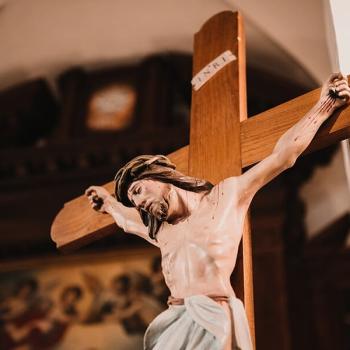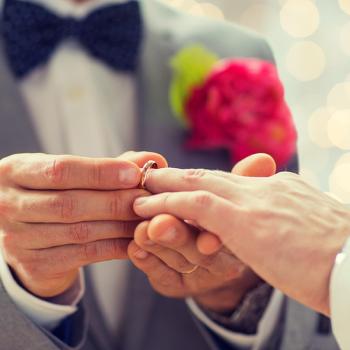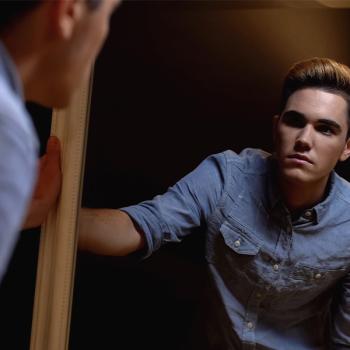When I shared with friends and colleagues, two years ago, that I would be matriculating to Yale Divinity School, I received mixed reactions, to put it mildly. “What?? Why?! Do you want to be a priest?!” One colleague asked, on four separate occasions, “Wait, are you really religious? It’s religious studies??” It was as though she was testing me to see if I’d give the same answers with a glass of wine in hand as I would under the harsh fluorescent lights of the office. Religion was both foreign and antiquated to my liberal, east coast acquaintances. Why, on earth, would I want to study doctrine or dogma? The assumption being that I was either a weak-willed woman or certifiably crazy. The implication coursing underneath the inquiries: aren’t you a feminist?
On the other hand, I received surprisingly enthusiastic responses, though those were fewer and farther between. Friends and former neighbors, mostly of my parents’ generation, wrote to me in celebration, “What amazing news, now God will really be with you.” To which I wanted to respond, “Well, hold on. I’m a feminist.”
Truthfully, I did not choose divinity school to become a priest or a minister. I had no real interest in doctrine or dogma. I could not even answer the seemingly simple, straightforward question, “What denomination are you?” I was drawn to divinity school for another, albeit also unconventional, reason. I wanted to study subjects rooted in ancient wisdom, like virtue. When I visited New Haven the week after the 2016 presidential election and the Dean of Admissions said to me, “Here you will learn how to reckon with difference, to meet the other at the sites of suffering,” I knew deeply that divinity school would test me in the best ways, so I could find the growing edges of my heart. While I did not have had the words in that moment, I felt something stirring within me. Though it was the beginning of a long unfurling, I sensed that, at Yale, I would find integration. I would find a feminist God.
Most of the people I love and know have had disillusioning experiences with organized religion and have left the traditions of their upbringings for good reasons. Their religions have failed the causes of justice in ways that truly align with the bedrock of Christian virtue. Instead of being places of love, sanctuary, and healing, their spaces of worship have emboldened toxic forms of power. This is not an alien experience to me. I have witnessed first-hand how religion, without necessarily realizing it, can oppress rather than liberate.
I was raised in the Catholic tradition in a rural-suburban community in Northeast Ohio. My family was the only biracial, bicultural family in the parish for many years. Church was where I felt more watched than welcomed. From an early age, the values I heard preached around my family dinner table were not embodied by our parish. I never found myself as one of the Sunday school or youth group students on fire for God at the front of the pack. Instead, I lingered toward the back, sitting alone, whispering questions to God, “Is this really what higher love looks like?”
I was five when I began asking why women could not be priests, why there were no women on the altar, why there were so few (or no) women speaking in church. As children are primed to do, I noticed because it seemed deeply unfair. “Different roles,” I was told.
I was twelve when I began noticing how Catholic culture controlled women’s bodies. Going through puberty, I suddenly understood in a new way what it meant to be female. My body was changing, which I sensed made me somehow more vulnerable I sensed. Sex before marriage was a sin, birth control was not sanctioned by the church, abortion was scourge of our society, and, women still could not lead the church.
Social teachings on sex and politics geared toward teenagers implied only women’s bodies were dangerous, the site of sin. In a video promoted by the church, an abstinence advocate stated, “If you have sex before marriage, you will die.” As an adult, I now deduce she meant that if you have unprotected sex before marriage, contract an STD that goes untreated, you may die without medical intervention. I heard phrases regularly that demeaned the female body, including but not limited to, “No man wants a used handkerchief.” I knew people who would stand outside of abortion clinics holding signs of bloody fetuses, shouting at women as they walked in.
I knew by age fifteen that women bore the brunt of both progress and the lack of it in not just the church, but also the culture at large. Women’s bodies were the site of sin and redemption of culture. Due to my more progressive education, I had learned enough about false equivalencies to understand that women’s bodies are not anything like handkerchiefs. I had also thought enough about the fabric of my own soul to know that I wanted an eventual partner who would love me unconditionally, who wouldn’t determine my marriageability based on my physical history.
In 2008, I was passionately engaged with the presidential election. While I’d always paid attention to politics, I was fully invested that year in reading profiles of each candidate and their positions on relevant issues, including the financial crisis, the Iraq War, healthcare, women’s issues, and LGBTQ rights. I decided to support Barack Obama. When a girl from youth group learned this, she equated me with Pontius Pilate publicly on Facebook, stating that I was a baby killer for supporting a democrat and that I was washing my hands clean of the deaths of innocent fetuses. I was a “baby killer.”
Meanwhile, in Mass every Sunday, we repeated prayers to the masculine Trinity and prayed to God named “Father.” Before us, only men interceding on our behalf.
In some circles of American life, being Christian has become associated with regressive ideas about women’s roles in public spaces and misinformation about climate change. Christianity’s advocacy is narrowly associated with groups standing outside of Planned Parenthood, holding huge signs with ‘Blood on your hands’ painted in red Halloween font.
If anyone had asked me in college if I would someday be in divinity school, I would have scoffed or even laughed aloud, “Absolutely not.” During those formative years, I was passionately engaged in sexual assault advocacy, founding the college’s first and only peer support system for survivors, and religion felt antithetical to that work, a thought system that undermined, demeaned, and objectified women and LGBTQ individuals, making violence to their bodies more probable and the problem more insidious. In quieter moments, however, when I would sit looking at the Green Mountains from my dorm room, I wondered, what would a God of radical love look like? And in those meditations, lines like this one from Maya Angelou floated into my consciousness, “Love liberates.”
Stepping away from the church meant stripping down the meaning of religion of my life. For so long, Catholicism sent me myriad messages about what it meant to be a woman: it does not matter what you feel, what you think, what you desire, what has happened to your body, what you are capable of – we’ve already decided what’s for you, and it’s certainly not leadership.
I could have walked away from faith, too, as I walked away from Catholicism, but another dialogue was coursing beneath my protests of fairness and feminism. In quieter moments, I could sense the presence of God in a different way. God did not feel like rules, but rather, like love. And in the light of that love, I did not feel abject for being a woman, I felt redeemed and held. I still maintain that God – the being so far beyond human understanding and comprehension – can handle tough questions.
It was dual consciousness – of feminism and faith – some union of mind, heart, and soul which led me to Yale. My first year in divinity school, I walked in all sorts of weather from my apartment to campus, passing New Haven’s Planned Parenthood clinic every time. Every week, I was inches away from men and women shouting to the vulnerable, sometimes with megaphones, “God has warned you!” This time, I did not have to ask a question to the void, I had an answer, “No. This is not what God’s love looks like.”
Studying theology, ethics, philosophy, history, and literature together is no walk in the park, I’ll tell you that much. In the first few months of divinity school, I felt the foundation of my life crumble under the weight of competing epistemologies. While I had searched my whole life for an intelligent religion, the process of finding peace in faith was much harder. I allowed the water of the words of feminist theologians and female mystics to reshape the rock of my faith.
Beautiful, rich, vibrant, life-giving portraits of God and God’s love are pervasive in these texts. But even as I read more, I continued to refer to God as “He.” Even though I had railed against this construction for over a decade, it was a tough habit, borne of internalized misogyny, to break. Elizabeth Johnson, a Catholic sister and feminist theologian, helped me see differently. In She Who Is: The Mystery of God in Feminist Theological Discourse writes, “Feminist liberation theology sees clearly that society and the church are pervaded by sexism with its twin faces of patriarchy and androcentrism. This social sin has debilitating effects on women both socially and psychologically, and interlocks with other forms of oppression to shape a violent and dehumanized world [where] women are bodily and sexually exploited, physically abused, raped, battered, and murdered.” Johnson takes deep issue with language itself, “Since language not only expresses the world but helps to shape and create it, learning to speak a language where the female is subsumed grammatically under the male gives girl children from the beginning the experience of a world where the male is the norm from which her own self deviates.”
Coupled with her critique of the Catholic Church, Johnson describes the Trinity in fully female terms, God as Sophia: Spirit-Sophia, Jesus-Sophia, and Mother-Sophia. And as I continued to read Christian theologies not pushing an agenda of maleness as divine and the divine as male, I found a truly liberating faith – one in line with my integrity. God met me there, in the rich and vibrant images of a feminist Godhead.
In the faith and religion of my childhood, God was a father, and Jesus was a man. End of story. Seeing God as fully female, too, was deeply healing to me. While I may once have felt vindicated, I felt then fully seen and loved, created, redeemed, sustained, truly like a child of God. Julian of Norwich was a fourteenth-century theologian, mystic, and anchoress, whose Revelations of Divine Love is the earliest surviving, English-language text penned by a woman. In Revelations, Julian writes, “Jesus Christ therefore, who himself overcame evil with good, is our true Mother. We received our ‘Being’ from Him and this is where His Maternity starts and with it comes the gentle Protection and Guard of Love which will never ceases to surround us. Just as God is our Father, so God is also our Mother.” These words resonated a note within me. I realized, for perhaps the first time, that the highest form of love is maternal love. As the Rev. Dr. Jacqui Lewis said to me, in an interview for my “Women of Faith: Stories of Reckoning and Wisdom” project, “Grace is like amniotic fluid.”
As a feminist, I care deeply about the liberation of all people. I identify as a woman of faith for my own freedom, but as a way of naming my commitment to creating a just, sustainable, and humane world. I want to be a person who tends to the vulnerable things, who speaks truth to power, who aligns principle with practice, who lives the Christian virtue of love. A feminist faith, I feel strongly, should as the question, “What could Christian advocacy look like with God as mother?”
Advocacy performed out of a feminist faith advocacy, for instance, might look a lot less like shouting at women outside of Planned Parenthood and a great deal more like creating a decentralized, multidimensional community health network. It would certainly look more inclusive, more nurturing, less violating. Power with, instead of power over. Love like connective tissue.
I pray to the Christian God, beyond human understanding, and I call her “She.” In my life, she is a “God, the Mother,” who loves everyone equally with fierceness and grace, who wills the flourishing of all beings, and who mothers us back to life. All that love, care, and solidarity leads me from insight to justice, from contemplation to action, from faith to feminism, from love to God’s work. This beautiful presence and now relationship gives me a faith of which I am very proud.














